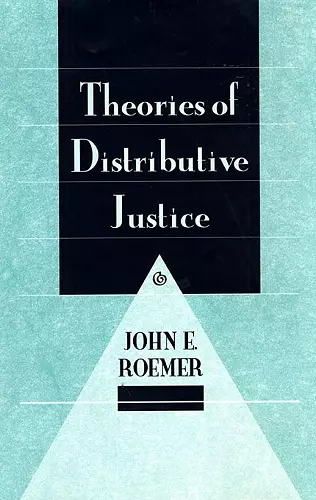Theories of Distributive Justice
Format:Paperback
Publisher:Harvard University Press
Published:12th Feb '98
Currently unavailable, and unfortunately no date known when it will be back

Equally at home in economic theory and political philosophy, John Roemer has written a unique book that critiques economists’ conceptions of justice from a philosophical perspective and philosophical theories of distributive justice from an economic one. He unites the economist’s skill in constructing precise, axiomatic models with the philosopher’s in exploring the assumptions of those models. His synthesis will enable philosophers and economists to engage each other’s ideas more fruitfully.
Roemer first shows how economists’ understanding of the fairness of various resource allocation mechanisms can be enriched. He extends the economic theory of social choice to show how individual preferences can be aggregated into social preferences over various alternatives. He critiques the standard applications of axiomatic bargaining theory to distributive justice, showing that they ignore information on available resources and preference orderings. He puts these variables in the models, which enable him to generate resource allocation mechanisms that are more consonant with our intuitions about distributive justice. He then critiques economists’ theories of utilitarianism and examines the question of the optimal population size in a world of finite resources.
Roemer explores the major new philosophical concepts of the theory of distributive justice—primary goods, functionings and capability, responsibility in its various forms, procedural versus outcome justice, midfare—and shows how they can be sharpened and clarified with the aid of economic analysis. He critiques and extends the ideas of major contemporary theories of distributive justice, including those of Rawls, Sen, Nozick, and Dworkin. Beginning from the recent theories of Arneson and G. A. Cohen, he constructs a theory of equality of opportunity. Theories of Distributive Justice contains important and original results, and it can also be used as a graduate-level text in economics and philosophy.
This book is a synthesis of work on distributive justice carried on in the past fifty years by economists and political philosophers… It is important in its own right and can be recommended to anyone with an interest in the subject who does not black out at the sight of a symbol… [A] remarkable achievement. I know of nobody else who combines Roemer’s mastery of formal analysis with his respect for the integrity of political philosophy and his deep understanding of it. -- Brian Barry * Times Higher Education Supplement *
In attempting to summarize and evaluate [a] large body of literature from the perspective of both economics and philosophy, Roemer set himself an ambitious goal. He has succeeded admirably… It will be invaluable to those wishing to understand the precise significance of recent contributions to the theory of distributive justice. Even those who choose to skip the more technical sections will appreciate the author’s profound knowledge of his subject and his lucid prose… [This is] as balanced and fair as one is likely to see on a topic which often generates more heat than light. -- A.F. Shorrocks * Journal of Economics [UK] *
I find Roemer’s critique of the work of both economists and philosophers penetrating. He is especially good at showing how early formulations in philosophy were found wanting and subsequently revised, giving one insight into the evolution of philosophical ideas. Roemer’s most impressive contribution, however, is not in synthesizing the philosophical literature but in formalizing its suppositions and drawing out their implications, using the methodological apparatus of modern economics. Throughout [the book] Roemer takes pains to discuss the broader meaning of his theorems in order to make his book more accessible to noneconomists. I believe that he largely succeeds, making the book one that political scientists and less formally trained public choice theorists can benefit from reading. -- Steven J. Brams * Public Choice *
In this book, Roemer gives us a very useful overview of [this] field… The main results of social choice and axiomatics of resource allocation are presented in a clear and non-technical, albeit rigorous, way, and are put in the perspective of philosophical debates on justice. Moreover, the lively style of this book makes it a very pleasant reading… This book is a very good synthesis and a very important contribution to a better understanding of normative economics, and to the dialogue between philosophers and economists. It gives the impression that what was once welfare economics and then social choice theory is now reaching a new stage of maturity, in particular thanks to Roemer’s own contributions to the field, and at the same time is full of promises for future developments. -- Marc Fleurbaey * Social Choice and Welfare *
Roemer maintains that the work of economists and philosophers on distributive justice can benefit from mutual acquaintance… The book is valuable. * Library Journal *
ISBN: 9780674879201
Dimensions: unknown
Weight: 503g
352 pages